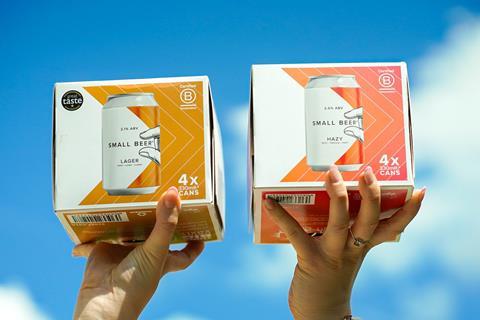Beer drinkers prefer mid-strength brews, new survey shows

Nearly four in 10 drinkers over 25 would prefer a mid-strength beer over one that leaves their head spinning, according to a new survey by YouGov.
The survey of 2,000 adults – commissioned by dedicated mid-strength challenger brand Small Beer Co – found 37% of those over the age of 25 would prefer to drink a beer with an abv of 2%-3% over a stronger brew.
This compared with 28% of drinkers aged 25-plus, who preferred beer in the 4%-5% abv range, and 41% that did not indicate a preference.
Seemingly dispelling the idea that Gen Z consumers are driving moderation trends, the only age cohort to prefer stronger beer was the 18-24 age group. Some 32% of those surveyed said they preferred 4%-5% abv beers, compared with 26% who said they liked their beer to be in the 2%-3% abv range.
Read more: How drinks brands are embracing moderation
“Although fewer of the younger demographic are drinking or drinking with the same regularity, when they do, the go hard or go home mentality appears to still exist,” said Small Beer co-founder James Grundy. “In contrast, an older generation with confidence in ordering drinks which align with their lifestyle are actively opting for lower unit options.”
The survey also found more than 50% of respondents believed alcohol affected their sleep. Some 53% of individuals aged 25-54 reported that alcohol negatively impacted their sleep quality.
This highlighted “a rising consciousness about the importance of sleep and the potential disruptive effects of alcohol upon it,” said Small Beer Co.
However, calorie content does not appear to be a major factor in consumers’ decision-making when purchasing alcoholic drinks, according to the survey data.
More than half (57%) of respondents aged 18-55 said they were not swayed by calorie counts when choosing what alcoholic drinks to buy.
Despite the preference towards more sessionable brews, drinkers are not necessarily looking to cut back on time socialising. Six in 10 adults (60%) aged 18-44 surveyed stated they wanted to “spend more time socialising with a good drink in hand”.
This showed how “people are becoming more mindful about the short-term impact of alcohol, but do not want to miss out on social occasions,” said Small Beer Co.
Leave a Reply Cancel reply
- Trending
- Comments
- Latest
Health care jobs are in demand in 2025 â one can pay $385,000
JPMorgan Chase COO Daniel Pinto stepping down in June
I’m Releasing a New Book!
China’s electric car boom is expected to slow down in 2025
TTMiles
Travel with me and experience each trip as a magical chapter in my travelogues. Come along with me as we discover the marvels of the globe one engrossing tale at a time.
Read more
Categories
Recent News
Health care jobs are in demand in 2025 â one can pay $385,000
JPMorgan Chase COO Daniel Pinto stepping down in June
© 2024 Trilliontravelmiles - The one stope travel news site by Trilliontravelmiles.















































